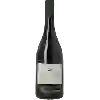
Domaine de FontainePouilly-Sur-Loire
This wine generally goes well with
The Pouilly-Sur-Loire of the Domaine de Fontaine is in the top 0 of wines of Pouilly-Sur-Loire.
Details and technical informations about Domaine de Fontaine's Pouilly-Sur-Loire.
Discover the grape variety: Herbemont
The origin of this American interspecific hybrid of the southern Vitis Aestivalis group, also called Vitis Bourquiniana, is not known for certain. In South Carolina (United States), it was propagated in the early 1800s by a Frenchman, Nicholas Herbemont (1771-1839), who found his first origins in Champagne. In France, it is one of six hybrids prohibited since 1935 (included in European regulations): Clinton, Herbemont, Isabelle, Jacquez, Noah and Othello. The Herbemont is very similar to the Jacquez - also called black spanish or lenoir - and has practically disappeared in favour of the latter.
Informations about the Domaine de Fontaine
The Domaine de Fontaine is one of of the world's great estates. It offers 2 wines for sale in the of Pouilly-Sur-Loire to come and discover on site or to buy online.
The wine region of Pouilly-Sur-Loire
The wine region of Pouilly-Sur-Loire is located in the region of Centre Loire of Loire Valley of France. Wineries and vineyards like the Domaine de Riaux or the Domaine Serge Dagueneau & Filles produce mainly wines white, red and sparkling. The most planted grape varieties in the region of Pouilly-Sur-Loire are Chasselas, Chenin blanc and Pinot noir, they are then used in wines in blends or as a single variety. On the nose of Pouilly-Sur-Loire often reveals types of flavors of earth, microbio or honey and sometimes also flavors of hazelnut, melon or straw.
The wine region of Loire Valley
The Loire Valley is a key wine region in western France. It follows the course of the Loire River on its Long journey through the heart of France, from the inland hills of the Auvergne to the plains of the French Atlantic coast near Nantes (Muscadet country). Important in terms of quantity and quality, the region produces large quantities (about 4 million h/l each year) of everyday wines, as well as some of France's greatest wines. Diversity is another of the region's major assets; the styles of wine produced here range from the light, tangy Muscadet to the Sweet, honeyed Bonnezeaux, the Sparkling whites of Vouvray and the juicy, Tannic reds of Chinon and Saumur.
The word of the wine: INAO
National Institute of Origin and Quality. French organization depending on the Ministry of Agriculture and in charge of quality signs: AOC, IGP, labels and organic farming.





